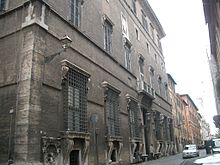
| Home | Sources Directory | News Releases | Calendar | Articles | | Contact | |
Ingeborg Bachmann
|
|
This article does not cite any references or sources. Please help improve this article by adding citations to reliable sources. Unsourced material may be challenged and removed. (March 2010) |
| Ingeborg Bachmann | |
|---|---|
| Born | 25 June 1926 Klagenfurt, Austria |
| Died | 17 October 1973 (aged 47) Rome, Italy |
| Nationality | Austrian |
| Notable award(s) |
Prize of the Group 47 1971 |
|
Influences
|
|
|
|
|
| Signature | |
Ingeborg Bachmann (25 June 1926 ' 17 October 1973) was an Austrian poet and author.
Contents |
[edit] Biography
Bachmann was born in Klagenfurt, in the Austrian state of Carinthia, the daughter of a headmaster. She studied philosophy, psychology, German philology, and law at the universities of Innsbruck, Graz, and Vienna. In 1949, she received her Doctor of Philosophy from the University of Vienna with her dissertation titled "The Critical Reception of the Existential Philosophy of Martin Heidegger,"[1] her thesis adviser was Victor Kraft.
After graduating, Bachmann worked as a scriptwriter and editor at the Allied radio station Rot-Weiss-Rot, a job that enabled her to obtain an overview of contemporary literature and also supplied her with a decent income, making possible proper literary work. Furthermore, her first radio dramas were published by the station. Her literary career was enhanced by contact with Hans Weigel (littérateur and sponsor of young post-war literature) and the legendary literary circle known as Gruppe 47, whose members also included Ilse Aichinger, Paul Celan, Heinrich Böll, Marcel Reich-Ranicki and Günter Grass.

In 1953, she moved to Rome, Italy, where she spent the large part of the following years working on poems, essays and short stories as well as opera libretti in collaboration with Hans Werner Henze, which soon brought with them international fame and numerous awards. Her relationship with the Swiss author Max Frisch (1911'1991) bestowed the role of the second protagonist in Frisch's 1964 novel Mein Name sei Gantenbein upon her. His infidelity and the separation of the couple in 1962 had a deep impact on Bachmann.
Bachmann's work primarily focuses on themes like personal boundaries, establishment of the truth, and philosophy of language, the latter in the tradition of Austrian philosopher Ludwig Wittgenstein. Her doctoral dissertation expresses her growing disillusionment with Heidegerrian Existentialism, which was in part resolved through her growing interest in Wittgenstein, whose Tractatus Logico-Philosophicus significantly influenced her relationship to language.
Ingeborg Bachmann died in the Roman Sant' Eugenio hospital three weeks after a fire in her bedroom, on 17 October 1973. While according to the local police authority the blaze was induced by a lit cigarette, the real cause of her death remains unknown. Rumors have persisted that she did not succumb to the burns but to her long habit of compulsive pill-taking, which was prevented by the stay in hospital. She is buried at the Annabichl cemetery in Klagenfurt.
[edit] The Ingeborg Bachmann Prize
The prestigious Ingeborg Bachmann Prize, awarded annually in Klagenfurt since 1977, is named after her.
[edit] Selected works
- "Darkness Spoken: The Collected Poems of Ingeborg Bachmann," translated and introduced by Peter Filkins, published by Zephyr Press, 2006. Bilingual on facing pages.
- Last Living Words: The Ingeborg Bachmann Reader, translated by Lilian M. Friedberg, published by Green Integer, 2005
- Letters to Felician (letters to an imaginary correspondent, written 1945, published posthumously). Edited & translated into English by Damion Searls. Green Integer Books, 2004.
- Die gestundete Zeit (lyric poetry, 1953)
- Die Zikaden (radio play, 1955)
- Anrufung des Grossen Bären (lyric poetry, 1956)
- Der gute Gott von Manhattan (radio play, 1958)
- "Die Wahrheit ist dem Menschen zumutbar" (poetological speech at a German presentation of awards, 1959)
- "Frankfurter Vorlesungen" (lecture on problems of contemporary literature, 1959)
- Der Prinz von Homburg (libretto, 1960)
- Das dreißigste Jahr (story volume, 1961)
- Der junge Lord (libretto, 1965)
- Malina (novel, 1971) Translated into English by Philip Boehm. Holmes & Meier, 1999.
- Simultan (story volume, 1972)
- Todesarten (novel-cycle project, unfinished)
- The Barking (short story)
[edit] See also
[edit] References
- ^ Brinker-Gabler, Gisela; Zisselsberger, Markus (2004). If We Had the Word: Ingeborg Bachmann Views and Reviews. Riverside, CA, USA: Ariadne Press. pp. 2. ISBN 9781572411302.
- Taylor, John: "Dark Struggles for a Utopia of Language (Ingeborg Bachmann)," Into the Heart of European Poetry, New Brunswick, New Jersey: Transaction Publishers, 2008, pp. 213'224.
[edit] External links
- author page at Lyrikline.org, with audio and text in German, and translations into Dutch.
|
SOURCES.COM is an online portal and directory for journalists, news media, researchers and anyone seeking experts, spokespersons, and reliable information resources. Use SOURCES.COM to find experts, media contacts, news releases, background information, scientists, officials, speakers, newsmakers, spokespeople, talk show guests, story ideas, research studies, databases, universities, associations and NGOs, businesses, government spokespeople. Indexing and search applications by Ulli Diemer and Chris DeFreitas.
For information about being included in SOURCES as a expert or spokesperson see the FAQ or use the online membership form. Check here for information about becoming an affiliate. For partnerships, content and applications, and domain name opportunities contact us.